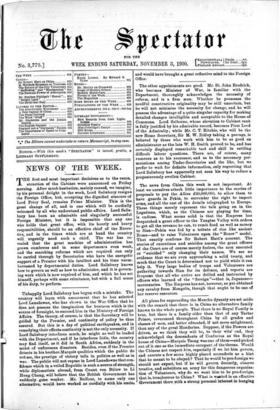Unhappily Lord Salisbury has begun with a mistake. The country
will learn with amazement that he has selected Lord Lansdowne, who has shown in the War Office that be does not possess the imagination for business which is the source of foresight, to succeed him in the Ministry of Foreign Affairs. The theory, of course, is that the Secretary will be guided by the Premier, and continuity of policy be thus assured. But this is a day of political earthquakes, and in remedying their effects continuity is not the only necessity. If Lord Salisbury interferes much, he might as well be loaded with the Department, and if he interferes little, the country may find itself, as it did in South Africa, suddenly in the midst of unforeseen disasters. Besides, even if the Premier detects in his brother-Marquis qualities which the public do not see, the prestige of victory tells in polities as well as in war. The public will not repose in Lord Lansdowne that con- fidence which in a veiled Republic is such a source of strength, while diplomatists abroad, from Count von Biilow to Li Hung Chang, will believe that the British Government has suddenly gone weaker. Mr. Balfour, to name only one alternative, would have worked as cordially with his uncle,
and would have brought a great reflective mind to the Foreign Office.






















































 Previous page
Previous page